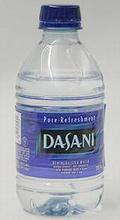 全球最大飲品公司可口可樂,隆重推出含植物材質的新型塑料瓶。 該公司表示,這款新型植物性塑料瓶(PlantBottle)比起聚乙烯對苯二甲酸酯(PET)塑料瓶,具有可回收、低污染等優勢。
全球最大飲品公司可口可樂,隆重推出含植物材質的新型塑料瓶。 該公司表示,這款新型植物性塑料瓶(PlantBottle)比起聚乙烯對苯二甲酸酯(PET)塑料瓶,具有可回收、低污染等優勢。
PET塑料瓶絕大成分來自不可再生資源--石油。而新的瓶裝則由一般塑料瓶材料和高達30%如甘蔗和糖蜜的植物性材質混合而成。
可口可樂北美區先從Dasani瓶裝水與部分品牌蘇打水市場率先試用植物性塑料瓶裝,明年相繼推出新瓶裝的維他命水。屆時,產品標示、商店内特賣區、網路傳銷媒介都會強調其環保的特性。
製作PlantBottle的方法是在PET塑料瓶的製程中加入甘蔗和糖蜜。同時,該公司還嘗試其他植物性材料,爲下一代的PlantBottle催生。
該公司稱,新的塑料瓶製程比PET塑料瓶環保效益高。據英國倫敦帝國學院做的生命週期分析顯示,含30%植物素材的PlantBottle可減少高達25%的碳排放量。
與其他植物性塑料不同的地方是,在不干擾傳統PET塑料純度的情況下,現有設備皆可生産回收PlantBottle。
Coca-Cola不僅是第一個引進再生塑料飲品瓶裝的公司,還重視其包裝材質的收集、回收、再利用,確實履行環保責任。
今年稍早,該公司在Spartanburg,南卡羅來納州開設了全球最大的塑料瓶回收廠(bottle-to-bottle),生産年回收量約1億磅的PET塑料,相當於近20億瓶20盎司的可樂供再利用。他們表示,這些都是公司為提供消費者永續包裝所付出的努力。
批評者說,他們希望具時尚感的玻璃可樂瓶也可回收。
For some of its beverages, The Coca-Cola Company is introducing a new type of plastic bottle made partially from plants. The world's largest beverage company says its new PlantBottle is recyclable, has a lower reliance on a non-renewable resource, and reduces carbon emissions compared with petroleum-based PET plastic bottles.
PET plastic bottles are made from petroleum, a non-renewable resource. The new bottle is made from a blend of petroleum-based materials and up to 30 percent plant-based materials such as sugar cane and molasses.
Coca-Cola North America will pilot the PlantBottle with Dasani and sparkling water brands in select markets later this year and with vitamin water in 2010. The new bottles will be identified through messages on the products as well as in-store point of sale displays. Online communications will highlight the bottles' environmental benefits.
The PlantBottle is made by turning sugar cane and molasses into a component in the manufacture of PET plastic. Coca-Cola is also exploring the use of other plant materials for future generations of the PlantBottle.
Manufacturing the new plastic bottle is more environmentally efficient than making PET bottles, the company says, citing a life-cycle analysis conducted by Imperial College London showing the PlantBottle with 30 percent plant-base material reduces carbon emissions by up to 25 percent.
Unlike other plant-based plastics, the PlantBottle can be processed through existing manufacturing and recycling facilities without contaminating traditional PET. So, the material in the PlantBottle can be used, recycled and reused again and again.
The Coca-Cola Company was first to introduce a beverage bottle made with recycled plastic. It has put resources behind creating packaging that is recyclable and investing in recycling infrastructure to ensure that its packages are collected, recycled and re-used.
Earlier this year, the company opened the world's largest plastic bottle-to-bottle recycling plant in Spartanburg, South Carolina. The plant will produce about 100 million pounds of recycled PET plastic for reuse annually - the equivalent of nearly two billion 20-ounce Coca-Cola bottles. The company says these efforts are all focused on helping "close the loop" on packaging use and produce truly sustainable packages for consumers.
Critics say they want a return of the iconic contour glass Coke bottles that are also recyclable.


